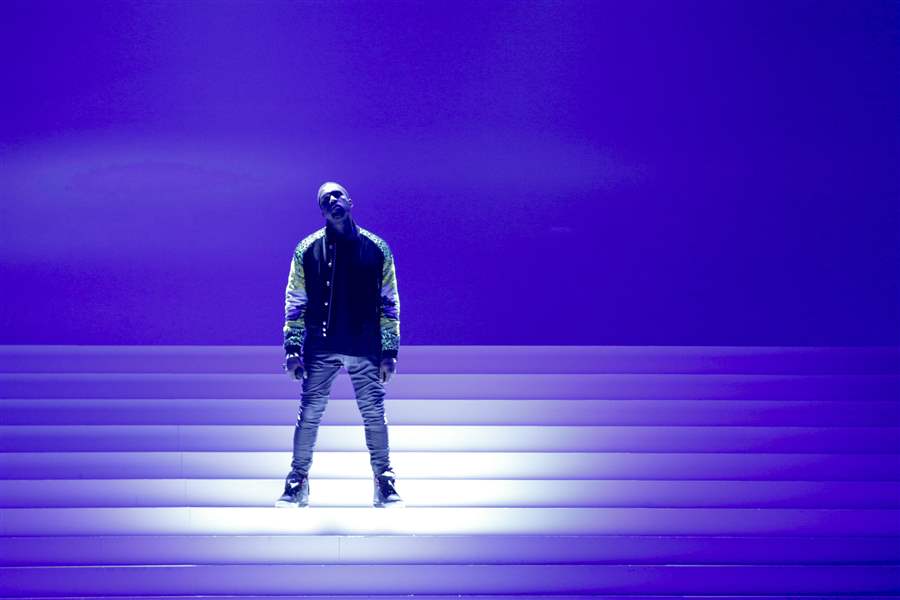
Ross Douthat: Delusions of Kanye
5/14/2018
The reactions to Kanye West’s right-wing flirtations in 2018 highlight the stifling sweatbox quality of contemporary liberal discourse, but it doesn’t change the depth of right-wing cluelessness on race, writes columnist Ross Douthat.
NEW YORK TIMES/ERIN BAIANO

Like many conservatives, I’ve taken some pleasure in the hysterical reaction to Kanye West’s recent right-wing flirtations: the panic of left-wing cultural consumers who have never had to separate an artist’s politics from his art, the aching thinkpieces from white liberals, the anathema from Pope Ta-Nehisi Coates.
But ultimately the joke in the Kanye experiment isn’t on liberals overreacting to his MAGA hat; it’s on conservatives excited by it. The episode highlights the stifling sweatbox quality of contemporary liberal discourse, but it doesn’t change the depth of right-wing cluelessness on race.
EDITORIAL: Kanye West and the responsibility of free speech
I don’t pretend to know how sincerely the artist sometimes known as Yeezy is flirting with reaction — though I suspect Kanyean Trumpism will end up resembling the “fascism” adopted by David Bowie in his Thin White Duke days. But I do know that his flirtations, in which he’s hung out with the right’s own race hustlers, are not a breakthrough moment for conservatives in their eternal quest to make the black Republican more than just an eccentric and embattled species. Instead, a celebrity who may be doing performance art is exactly the African-American “supporter” the Trump-era right deserves.
This is not because there is no common ground between conservatism and the black community. Indeed, a striking irony of this era is that the potential common ground has arguably increased.
The sociological transformation of the Republican Party into a working-class party means that its base has more in common economically with the average black American than the country-club GOP of yore. The secularization of American society means that the religious right and the churchgoing African-American community share a metaphysical worldview that’s faded elsewhere in our spiritual-but-less-religious nation. And the economic populism and foreign-policy anti-interventionism of Trumpism — well, at least campaign-season Trumpism — were closer to common African-American views than the typical Republican agenda.
So black America and conservatism have converged in interesting ways — but in the most important way they are inevitably divided, for the obvious reason that Donald Trump’s ascent began with a racist conspiracy theory and then added other white-identitarian appeals.
It is a liberal mistake to think that bigotry suffices to explain the Trump phenomenon. But it is a conservative error, naive or culpably ignorant, to act disappointed that black Americans aren’t attracted to a coalition led by a barely-repentant “birther” who flirts with white supremacists.
For decades, the essential failure of conservative outreach to African-Americans has been the insistence that the right just want to treat black Americans as individuals — a fine-sounding idea, except that white America has never found a way to treat its former slaves that way, making black identity politics not an indulgence but a matter of survival.
To this failure Mr. Trump has added an exclamation point. He has been shrewder than libertarian conservatives in recognizing that individualism is not enough, that the right needs a politics of solidarity. But his appeals to solidarity have often been racially exclusive in exactly the ways an African-American skeptic of conservatism would have predicted.
Is there an alternative? Realistically, maybe not: In the shadow of Trump, the pan-ethnic conservatism the country (and, for its long-term survival, the GOP) needs may be a fantasy. But conservatives who want their politics to be pan-ethnic might ponder two initial changes in how they approach racism and race.
First, conservatives who resist the idea that today’s racism can be legislated away need to think harder about how to honor the particularities of the African-American experience.
You don’t want to take down every Confederate statue or dethrone slave-owning founders? OK: What monuments to the slave or Jim Crow experience will you enthusiastically support? What more capacious retellings of history, with black heroes instead of sentimentalized Confederates, are you willing to endorse?
You don’t want the federal government interfering with local law enforcement? OK: Then when black people are obviously victims of local institutions, are you willing to elevate and defend them, to make them a cause célèbre, to act as if their concerns are yours as well?
Second, conservatives who want black Americans to give their policies a new hearing should repudiate policies that on the margins tend to disenfranchise black voters.
If you’re telling African-Americans that their current political leadership is failing them, don’t package that message with the exaggerations about “urban” voter fraud that too many Republicans have propagated. If you want people to consider joining your coalition, act like you want to compete for their vote, not just discourage them from voting.
These two suggestions are a beginning, not an end, and the right is obviously better off listening to actual black people than extremely white columnists like me.
But a red-pilled rapper is a bad place to start that listening tour — at least if conservatives want a real bridge, not just a Kanye dream palace, linking worlds that are strangely close in certain ways but also as far apart as ever.
Ross Douthat is a New York Times columnist.